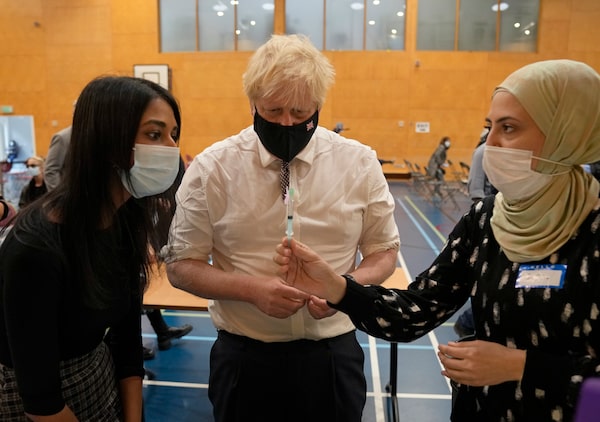
British Prime Minister Boris Johnson watches as staff dilute a dose of the Pfizer vaccine before administering it as he visits a COVID-19 vaccination centre, in London, Oct. 22.Matt Dunham/The Associated Press
Not that long ago, Britain’s vaccination program was the envy of the world, as the U.K. raced ahead of almost every other country in immunizing its people against COVID-19.
The inoculation drive went so well that Prime Minister Boris Johnson made vaccines the cornerstone of the government’s pandemic strategy, eschewing mask requirements and vaccine passports.
But now the much-vaunted campaign has stalled – a survey by the Office for National Statistics (ONS) found that 16-to-29-year-olds are the most vaccine hesitant – and Britain lags behind Canada, France, Italy, Spain and several other countries in the proportion of people who have been fully vaccinated. Even the European Union as a whole – often mocked in Britain for its slow start on vaccinations – has almost caught up to the U.K.
Infections are surging in Britain now, topping 50,000 a day this week. The rolling seven-day average has increased 18 per cent. On Friday the ONS estimated that one in 55 people in England has been infected with the virus, the highest rate of infection since last January, when the pandemic peaked. Britain is recording more daily cases than France, Germany, Italy and Spain combined.
An NHS COVID-19 vaccination health campaign advertisement in London.TOBY MELVILLE/Reuters
Mr. Johnson is coming under increasing pressure to kickstart vaccinations and reconsider the government’s resistance to mask mandates and vaccine passports. “The government has taken its foot off the brake, giving the impression that the pandemic is behind us and that life has returned to normal,” the British Medical Association said this week. “It is wilfully negligent of the Westminster government not to be taking any further action to reduce the spread of infection.”
New COVID-19 mutation of Delta variant under close watch in U.K.
One reason for the vaccination slowdown has been the government’s indecision over immunizing children. After months of debate, health officials began inoculating children 12 to 15 years old on Sept. 20, much later than Canada and many other countries – even though the government’s scientific advisory body, the Joint Committee on Vaccination and Immunization, had concluded that there were only marginal benefits. That caused confusion about the shots, and as a result the take-up has been slow.
Britain has also become a victim of the early success of its vaccination drive, as immunity seems to be waning, particularly among elderly people who received their second shots last winter.

Mr. Johnson has continued to resist calls to impose new social restrictions and mandates.Alberto Pezzali/The Associated Press
Several studies have shown that the effectiveness of COVID-19 vaccines fades after five or six months. The Zoe Covid Study, published in the British Medical Journal in August, found that the efficacy of the Pfizer-BioNTech vaccine fell from 88 per cent to 74 per cent after six months, while the Oxford-AstraZeneca shot’s protection dropped from 77 per cent to 67 per cent. The U.K. has relied mainly on the AstraZeneca jab, which other studies have also shown loses its effectiveness faster than the Pfizer shot.
The government has launched a booster program for adults older than 50, but so far the pace of vaccinations has been sluggish. Experts say that’s partly because many people don’t have the same sense of urgency, especially since the government dropped almost all pandemic restrictions in July.
“We are at a tipping point with increased levels of infection against a backdrop of waning vaccine-induced immunity and the easing of all restrictions,” said Lawrence Young, a professor of molecular oncology at the University of Warwick. “We must do everything to encourage those eligible to get their booster jabs and to vaccinate healthy 12-to-15-year-olds.”

On Friday the ONS estimated that one in 55 people in England has been infected with COVID-19, the highest rate of infection since last January, when the pandemic peaked.Alberto Pezzali/The Associated Press
Mr. Johnson has so far resisted calls to impose new social restrictions and mandates. Instead, he’s sticking to his Plan A, which focuses on booster shots and vaccinating children. “Our plan always predicted that the cases would rise around about now, and we’re certainly seeing that in the numbers,” the Prime Minister said Friday. “We’re seeing high levels of infection, but they’re not outside the parameters of what was predicted.”
There have been some positive signs. The number of people admitted to hospital with COVID-19 has been trending at about 1,000 a day, roughly a quarter of the level reached last January. Deaths have also been far lower – down from more than 1,000 a day to just over 100.
There’s growing concern about a new version of the Delta variant, called Delta Plus, which has surfaced in small but growing numbers across England.CARL RECINE/Reuters
However, health experts say both figures have been rising and they worry about the strain hospitals will come under this winter when the flu and other seasonal viruses take hold. Health Secretary Sajid Javid warned this week that daily COVID-19 cases could hit 100,000 this winter in a worst-case scenario.
There’s also concern about a new version of the Delta variant, called Delta Plus, which has surfaced in small but growing numbers across England. Scientists say it could be as much as 15 per cent more transmissible, but for now it has not been labelled a variant of concern.
The NHS Confederation, which represents National Health Service trusts, has urged the government to introduce mask requirements and vaccine certificates and to advise people to work from home. “The government should not wait for COVID infections to rocket and for NHS pressures to be sky high before the panic alarm is sounded,” said Matthew Taylor, the confederation’s chief executive.
Our Morning Update and Evening Update newsletters are written by Globe editors, giving you a concise summary of the day’s most important headlines. Sign up today.
 Paul Waldie
Paul Waldie